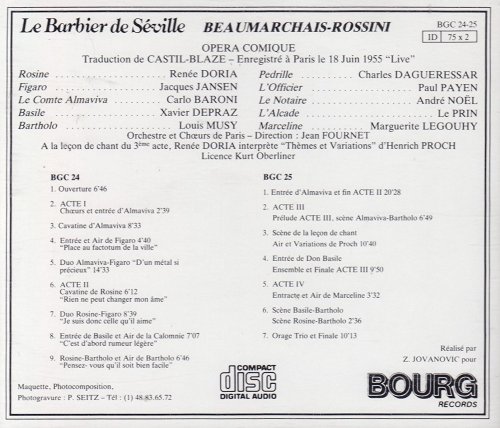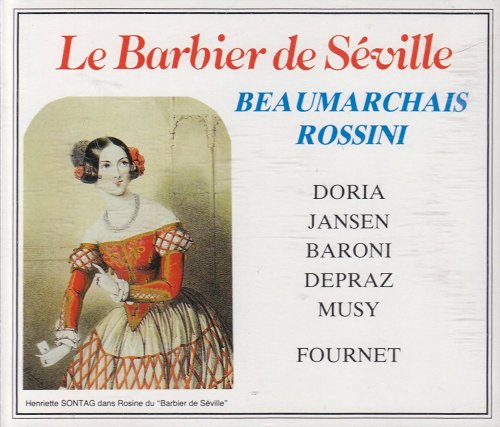
Jean Fournet - Rossini: Le Barbier De Seville (1991)
BAND/ARTIST: Jean Fournet
- Title: Rossini: Le Barbier De Seville
- Year Of Release: 1991
- Label: Bourg Records
- Genre: Classical
- Quality: FLAC (image + .cue, log, scans)
- Total Time: 02:10:00
- Total Size: 494 MB
- WebSite: Album Preview
Tracklist:
CD 1
01 Ouverture
ACTE 1
02 Chœurs et entrée d'Almaviva
03 Cavatine d'Almaviva : « Des rayons de l'aurore »
04 Entrée et air de Figaro : « Place au factotum de la ville »
05 Duo Almaviva-Figaro : « D'un métal si précieux »
ACTE II
06 Cavatine de Rosine : « Rien ne peut changer mon âme »
07 Duo Rosine-Figaro : « Je suis donc celle qu'il aime »
08 Entrée de Basile et Air de la Calomnie : « C'est d'abord rumeur légère »
09 Scène Rosine-Bartholo et Air de Bartholo « Pensez-vous qu'il soit bien facile »
CD 2
01 Entrée d' Almaviva et fin de l'Acte II
ACTE III
02 Prélude de l'Acte III et scène Almaviva-Bartholo
03 Scène de la leçon de chant et « Air et Variations de Proch »
04 Entrée de Basile suivie du finale de l'Acte III
ACTE IV
05 Entracte suivi de l'Air de Marceline
06 Scène Basile-Bartholo suivie de la scène Rosine-Bartholo
07 Orage, Trio et Finale

CD 1
01 Ouverture
ACTE 1
02 Chœurs et entrée d'Almaviva
03 Cavatine d'Almaviva : « Des rayons de l'aurore »
04 Entrée et air de Figaro : « Place au factotum de la ville »
05 Duo Almaviva-Figaro : « D'un métal si précieux »
ACTE II
06 Cavatine de Rosine : « Rien ne peut changer mon âme »
07 Duo Rosine-Figaro : « Je suis donc celle qu'il aime »
08 Entrée de Basile et Air de la Calomnie : « C'est d'abord rumeur légère »
09 Scène Rosine-Bartholo et Air de Bartholo « Pensez-vous qu'il soit bien facile »
CD 2
01 Entrée d' Almaviva et fin de l'Acte II
ACTE III
02 Prélude de l'Acte III et scène Almaviva-Bartholo
03 Scène de la leçon de chant et « Air et Variations de Proch »
04 Entrée de Basile suivie du finale de l'Acte III
ACTE IV
05 Entracte suivi de l'Air de Marceline
06 Scène Basile-Bartholo suivie de la scène Rosine-Bartholo
07 Orage, Trio et Finale

Methodical, unflappable (he is said to have seldom raised his voice), and subtle in the ways of the French repertory, Jean Fournet saw his career extend over an extraordinarily long period. After having established himself in his native country, he proved a welcome addition to opera companies in America, where the French style had become something of a lost art. Beyond stage work, he proved, both early and late, a persuasive interpreter of the French symphonic literature. After studies at the Paris Conservatoire, Fournet made his debut in his native city in 1936; two years later, he was engaged by Rouen on a permanent basis. In 1940, he moved to Marseilles and, beginning in 1944, presided over the Paris Opéra-Comique as music director, simultaneously offering instruction in the art of conducting at the École Normale. In the 1950s, he was involved in several recording projects that enhanced his reputation considerably, notably his Fauré Requiem and a lightly turned Les Pêcheurs de perles. Two further appointments awaited him in Europe before he turned to a regimen of guest conducting: in 1961 he became conductor of the Netherlands Radio Symphony, and from 1968 to 1973, he served as artistic director of the Rotterdam Philharmonic Orchestra. Fournet made his American opera debut with the Chicago Lyric Opera in 1965 directing a double bill consisting of a staged Carmina Burana and Ravel's magical L'heure espagnole, the latter with Teresa Berganza, Alfredo Kraus, and Sesto Bruscantini. The conductor impressed immediately as one who could imprint elegance and respect for French style on his casts. His success led to further assignments, each helping reestablish the French wing in a city that had known great French artists in decades past. Among the productions were Les Pêcheurs de perles in 1966, another double bill (Le Rossignol and Oedipus Rex) in 1968, Werther in 1971, Pelléas et Mélisande in 1972, Manon in 1973, and Don Quichotte in 1974. In 1987, Fournet made his Metropolitan Opera debut conducting a production of Samson et Dalila. In addition to a number of orchestral discs, Fournet recorded the aforementioned Les Pêcheurs de perles for Philips with Léopold Simoneau and Pierrette Alarie, still unsurpassed. Fournet's Fauré and Berlioz Requiems are also impressive, likewise his 1973 Chicago Manon with Kraus and Zylis-Gara. -- Erik Eriksson
Classical | Musique Française | FLAC / APE | CD-Rip
As a ISRA.CLOUD's PREMIUM member you will have the following benefits:
- Unlimited high speed downloads
- Download directly without waiting time
- Unlimited parallel downloads
- Support for download accelerators
- No advertising
- Resume broken downloads


